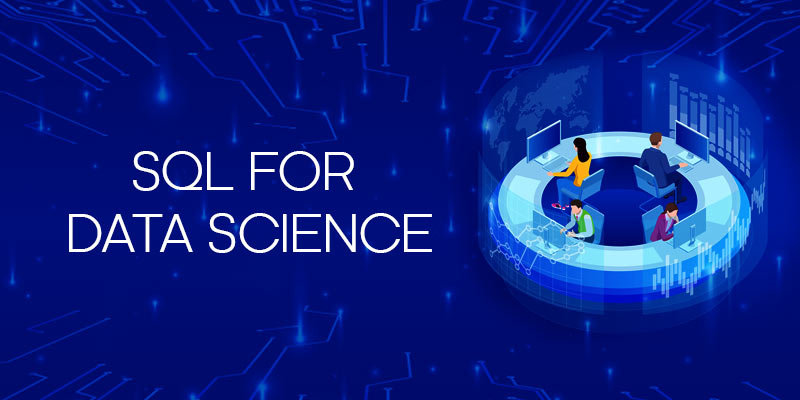
SQL For Data Science - A Brief Guide on Skills That Matter in 2025
- Oct 18, 2024
- | 9
Data science is the field where professionals must work consistently with data, analyze it, and make insightful and calculated business decisions. SQL's contribution in the field is unmatched when it comes to managing databases.
According to a report by IBM, the demand for data scientists is projected to increase by a staggering 28% by 2025
For professionals willing to switch or begin their careers in the data science field, proficiency in SQL is highly beneficial. This detailed guide delves into data science with SQL role, highlighting the steps to enter this career field.
What is SQL?
SQL, short for structured query language, is one of the most used programming languages to store, process, and analyze data in a relational database. The data can be easily stored in tabular format in rows and columns to examine the relation between data values. SQL is renowned for its wide applications, including data science workflow. From data analysts and developers to data scientists, professionals rely on SQL as it easily integrates with other programming languages.
Role of SQL for Data Science
SQL is a powerful and globally recognized programming language. Just like Python for data science is known for its flexibility, SQL is now a mandatory skill required to interact with the data. Key Features include:
-
Data Extraction
Data scientists and professionals use SQL to extract selected data from databases. With queries, data can be easily filtered based on date, time, location, values, and other variables.
-
Update Data
The data collected is not filtered or organized. SQL programming language helps professionals transform data and create new tables for better understanding.
-
Data Exploration
The critical job of data scientists is to examine and identify trends and patterns in datasets. With SQL queries, you can calculate metrics between data values.
-
Aggregation of Data
With SQL, professionals can work on data sets, summarize the statistics, group them based on different categories, and perform calculations on the same.
-
Data Visualization
Visualization is the key to understanding and making sense of complex data. SQL aids data scientists in creating visuals with tools like Tableau, Power BI, and so on.
-
Can Handle Huge Dataset
SQL is capable of handling huge amounts of data. The language can easily manipulate big databases, making it appropriate for data scientists. Professionals who work with huge data like financial data or customer information, consider SQL as an ideal choice.
Here is a brief take on how to build a career in data science with SQL.
Learning SQL for Data Science
Learning a new skill, especially in the machine learning and data science field, can be overwhelming. We have broken down the roadmap into steps to avoid confusion.
Step1: Get Familiar With Database System
Professionals work on SQL along with databases like MySQL, Oracle, SQLite, and more. Read free online resources like blog posts and YouTube tutorial videos to understand the ins and outs of database. With basic knowledge, install the database on your system and get familiar with how it works.
Step2: Learn Basic Query Commands
Since you have decided to learn about SQL, begin with understanding basic commands of the programming languages regarding tables like:
- Create: Used to make a new table in the database
- Update: To alter and modify the values in the table
- Insert: To add new values in the record
- Delete: To erase the value
Step3: Search for Guided Projects
Data analytics, machine learning, and data science, and more are practical subjects. Gaining and relying on theoretical knowledge will not give you higher results. After setting up the foundation of SQL programming language, look for easy and guided projects to work on. With this, you will be able to apply what you have learned and know where you stand when it comes to proficiency.
Step4: Build a Portfolio
As mentioned, to get a job in Data Science with SQL skills, theory knowledge will benefit you to a certain level. Practical knowledge must be shown to hiring managers to learn in-depth, get a job, or get promoted. This knowledge can only be shown in your portfolio, which consists of projects that you have voluntarily done.
Consistently challenging your existing skills, yearning to learn new skills, keeping up with updates, and more will deepen your knowledge and help in data science workflow.
Conclusion
As the data continues to grow in the market, so does the demand for data scientists and analysts to work on this data and offer insights. Learning SQL skills will also benefit you in real-world jobs. The language seamlessly allows you to work with structured and unstructured data stored in the database. And, being data scientists, professionals will require SQL language to extract, analyze, and manipulate the database.
From essential to advanced commands, you will utilize the skills learned in analytical jobs in the future.
With sheer dedication and being updated with real-world skills, SQL can help you to




.jpg)